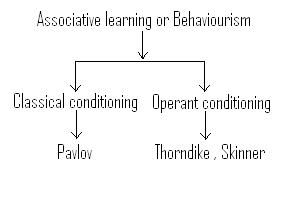User:Ramaa/Learning
UNIT 8 – LEARNING
Unit Structure
8.0 Objectives
8.1 Introduction
8.2 Definition & Concept of learning
8.3 Different approaches to learning
8.4
8.5 Let us sum up
8.6 Questions
Dear students! Just to refresh your memory, from the previous units you must have a fair idea about the meaning and scope of psychology of learning, various methods used to study it and the different aspects in the growth and development of the human child. Well, in this unit we will be focusing on the most important and pivotal activity in the life of human beings – Learning. At the completion of this unit you will be able to
|
8.1 Introduction
Dear Students! What does the word “learning” bring to your mind? College, school, homework, books, examination, teachers, fun, prizes, punishments, games,picnics or heavy loads….? You see, in this very simple exercise lies the essence of what learning is all about. Let me clarify. For some of you the exercise may bring pleasant memories, for others not. Why? Most of you may recall all the subjects you learnt at school but not what you learnt in them.
♣ Why are we able to recall nursery rhymes and tables of mathematics instantly?
♣ Why are Physics principles and Chemical formulae not remembered as easily?
♣ Why some experiences in life leave a lasting impression on you while others leave you unaffected? Well, these “whys” have interested psychologists & educationists alike & from their attempts to answer these questions they have tried to define learning and formulated theories to explain how people learn.
Definition of learning
Learning, in psychology, is defined as a process that occurs when experience causes a relatively permanent change in an individual’s behaviour and knowledge. The change may be deliberate or unintentional, for the better or the worse.
To qualify as learning, this change must be brought about by experience – by the interaction of a person with his or her environment. Changes due simply to maturation- (the process by which biologically predetermined patterns of behaviour unfold more or less on schedule) – such as a toddler’s beginning to talk is not learning. We cannot see learning directly. The only thing we have available for observation is the performance or the behavior of the individual. But this change is a reflection of what has occurred within the person. These two aspects of learning – the change within the individual and its overt expression – have led to different approaches in learning which is discussed in the next section.
These are two main approaches to learning viz. the Behaviouristic approach and the Cognitive approach. Theories of learning based on behaviouristic approach are called behaviouristic theories or associative theories and the ones based on Cognitive approach are called Cognitive theories or Gestalt theories.
Behavioural psychologists emphasise changes in behaviour as the outcome of learning. They are concerned with the effects of external events on the individual’s responses. In contrast, Cognitive psychologists say that learning itself is an internal process that cannot be observed directly. The change occurs in a person’s ability to respond to a particular situation. The change in behaviour is only a reflection of the internal change.
Cognitive Psychologists have been more interested in explaining how the many types of human learning actually take place. They have attempted to find out how different people solve problems, learn concepts, perceive and remember information and accomplish many other complex mental tasks.
Self- Check Exercise:-I
{{Self_assignment/Answer the following questions in the given space:
1] What is maturation? --------------------------------------------------------------------------------------------------------------------------------------------------------------------------------------------------------------------------------------------------------------------------------------------------------------------------------------------------------------------------.
2] Define -the term “ learning”. ---------------------------------------------------------------------------------------------------------------------------------------------------------------------------------------------------------------------------------------------------------------------------------------------------------------------------------------------------------------------
3] Name the two approaches to learning. . ---------------------------------------------------------------------------------------------------------------------------------------------------------------------------------------------------------------------------------------------------------------------------------------------------------------------------------------------------------}}
| Work in progress, expect frequent changes. Help and feedback is welcome. See discussion page. |

